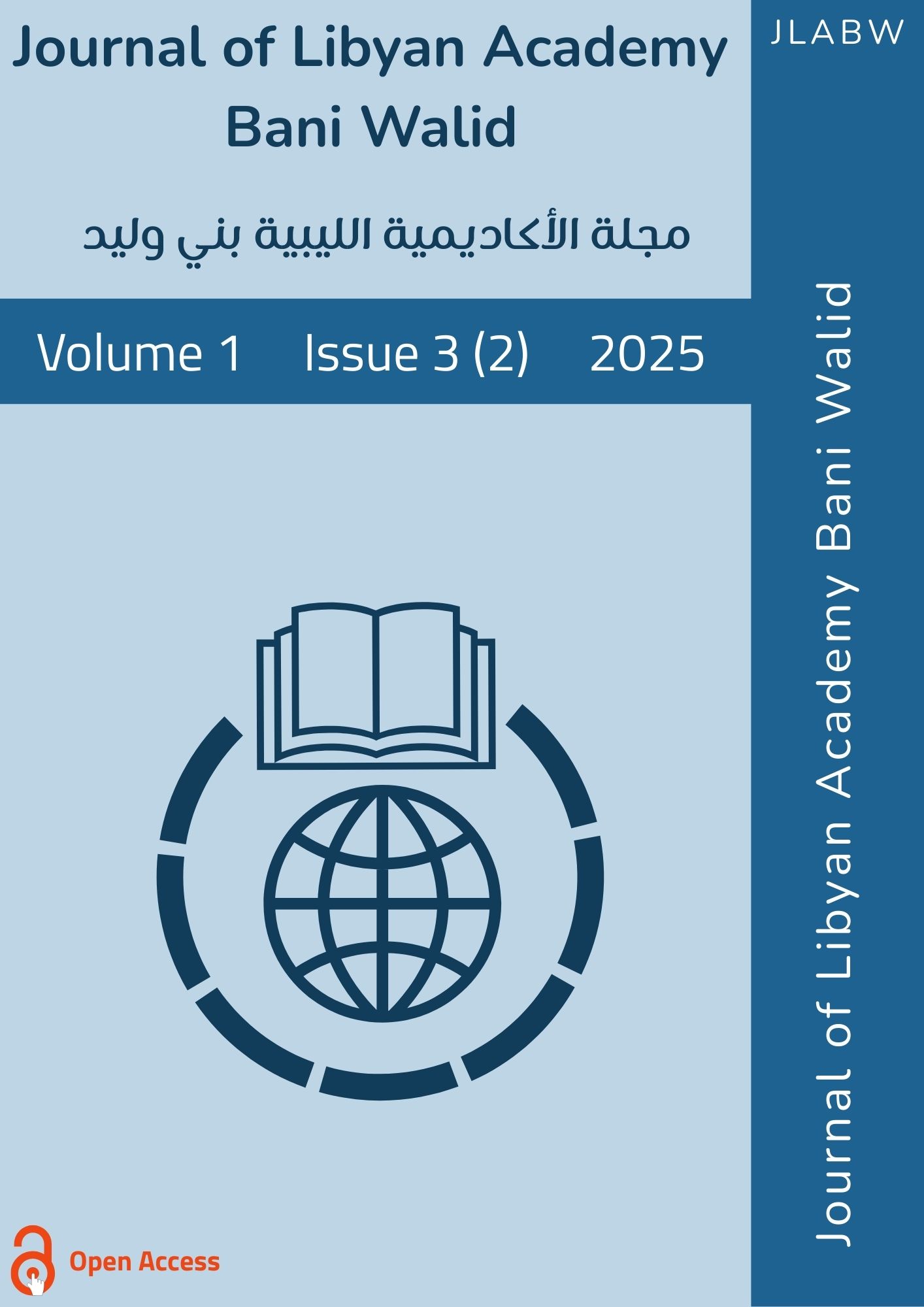Effect of seed soaking in proline on growth and production of salt-stressed maize plants
DOI:
https://doi.org/10.61952/jlabw.v1i3.194Keywords:
Salinity, proline, maize, growth and yield components, photosynthetic pigments, osmoprotectantsAbstract
Seed soaking using osmo-regulatory compounds, including proline, is a promising approach to enhance crop tolerance to abiotic stresses, including salinity. The impact of seed soaking in 3.0 mM proline on maize plants under salt stress was examined. Salt stress was induced by using 70 mM and 140 mM NaCl. This study aimed to uncover the positive effects of proline on salt-stressed plant performance. Findings showed that photosynthetic pigments (chlorophyll and carotenoid contents), K+ content, K+/Na+ ratio, and plant growth and yield traits were significantly decreased when maize plants exposed to 70 mM (moderate) and 140 mM NaCl (severe salt stress). The 140 mM NaCl was more dangerous than the 70 mM NaCl. However, seed soaking in 3.0 mM proline mitigated salt stress effects and significantly increased photosynthetic pigments, proline and K+ contents, K+/Na+ ratio, and plant growth and yield traits compared to the controls. Therefore, this study recommends the use of 3.0 mM proline as a seed soaking solution to enhance the maize's ability to tolerate salt stress.
References
Alharbi, K., Desoky, E. S. M., Rady, M. M., Selem, E., & Elrys, A. (2024). Enhancing salt tolerance in maize using co-application of exogenously applied lipoic acid or silicon with soil-based vermicompost-tea by reinforcing antioxidant defense mechanisms and regulating plant performance. Chilean journal of agricultural research, 84(5), 686-698.
Alzahrani, Y., Kuşvuran, A., Alharby, H. F., Kuşvuran, S. & Rady, M. M. (2018). The defensive role of silicon in wheat against stress conditions induced by drought, salinity or cadmium. Ecotoxicol. Environ. Saf. 154, 187–196.
Arnon, D.I. (1949). Copper enzymes in isolated chloroplasts, polyphenoxidase in Beta vulgaris. Plant Physiol. 24, 1‒15.
Aslam, M. et al. (2017). Specific role of proline against heavy metals toxicity in plants. Int. J. Pure App. Biosci. 5(6), 27–34.
Bates, L.S.; Waldren, R.P.; Teare, I.D. (1973). Rapid determination of free proline for water stress studies. Plant Soil 39, 205–207.
Chapman, H.D.; Pratt, P.F. (1961). Methods of Analysis for Soil, Plants and Water. University of California, Division of Agricultural Science, Berkeley, CA, USA, pp. 56–63.
de Freitas, P. A. F., de Souza Miranda, R., Marques, E. C., Prisco, J. T., and GomesFilho, E. (2018). Salt Tolerance Induced by Exogenous Proline in Maize Is Related to Low Oxidative Damage and Favorable Ionic Homeostasis. J. Plant Growth Regul. 37, 911–924
Desoky, E. M., Mansour, E., Yasin, M. A. T., El-Sobky, E. E. A. & Rady, M. M. (2020). Improvement of drought tolerance in five different cultivars of Vicia faba with foliar application of ascorbic acid or silicon. Span. J. Agric. Res. 2, e0802.
El Moukhtari A, Cabassa-Hourton C, Farissi M and Savoure´ A (2020). How Does Proline Treatment Promote Salt Stress Tolerance During Crop Plant Development? Front. Plant Sci. 11:1127.
El-Sappah A. H., et al. (2023). Interplay of silymarin and clove fruit extract effectively enhances cadmium stress tolerance in wheat (Triticum aestivum). Front. Plant Sci. 14(14), 1144319.
El-Sappah, A. H., & Rather, S. A. (2022). Genomics approaches to study abiotic stress tolerance in plants. Plant Abiotic Stress Physiol. 2, 25–46.
FAOSTAT. (2024). Statistical database. Food and Agriculture Organization of the United Nations, Rome, Italy. Available at http://www.fao.org/faostat/en/#data (accessed 1st January 2024).
Gou, C., Huang, Q., Rady, M. M., Wang, L., Ihtisham, M., El-Awady, H. H., ... & El-Sappah, A. H. (2023). Integrative application of silicon and/or proline improves Sweet corn (Zea mays L. saccharata) production and antioxidant defense system under salt stress condition. Scientific Reports, 13(1), 18315.
Hoagland, D.R.; Arnon, D.I (1950). The water culture method for growing plants without soil. University of California, College of Agriculture, Agricultural Experiment Station, Baltimore, USA.
Irigoyen, J.J.; Emerich, D.W.; Sanchez-Diaz, M. (1992). Water stress induced changes in the concentrations of proline and total soluble sugars in nodulated alfalfa (Medicago sativa) plants. Plant Physiol. 8, 455–460.
Khan, A., Iqbal, I., Ahmed, I., Nawaz, H., and Nawaz, M. (2014). Role of proline to induce salinity tolerance in sunflower (Helianthus annus L.). Sci. Technol. Dev. 33, 88–93.
Lachica, M.; Aguilar, A.; Yanez, J. (1973). Analisis foliar. Métodos Utilizados enla estaciln experimental del zaidin. Anales de edafologia y agrobiologia 32, 1033–1047.
Marschner, H. (1995). Mineral nutrition of higher plants, 2nd Ed., Academic Press, London ISBN 01247 35436.
Munns, R. (2002). Comparative physiology of salt and water stress. Plant Cell Environ. 25, 239–250 (2002).
Rady, M. M. et al. (2023). Spirulina platensis extract improves the production and defenses of the common bean grown in a heavy metals-contaminated saline soil. J. Environ. Sci. 129, 240–257.
Rady, M. M., Elrys, A. S., Abo El-Maati, M. F. & Desoky, E. M. (2019). Interplaying roles of silicon and proline effectively improve salt and cadmium stress tolerance in Phaseolus vulgaris plant. Plant Physiol. Biochem. 139, 558–568.
Singh, M., Kumar, J., Singh, V.P., Prasad, S.M. (2014). Proline and salinity tolerance in plants. Biochem. Pharmacol. 3, 6.
Steel, R.G.D.; Torrie, J.H.; Dicky, D.A. (1997). Principles and procedures of statistics: a biometrical approach, 3rd eds. McGraw-Hill, Book International Co., Singapore.
Sundstrom, F.J.; Reader, R.B.; Edwards, R.L. (1987). Effect of seed treatment and planting method on Tabasco pepper. J. Amer. Soc. Hortic. Sci. 112, 641–644.
Wani, A. S., Ahmad, A., Hayat, S., and Tahir, I. (2016). Is foliar spray of proline sufficient for mitigation of salt stress in Brassica juncea cultivars? Environ. Sci. Pollut. Res. 23, 13413–13423.








